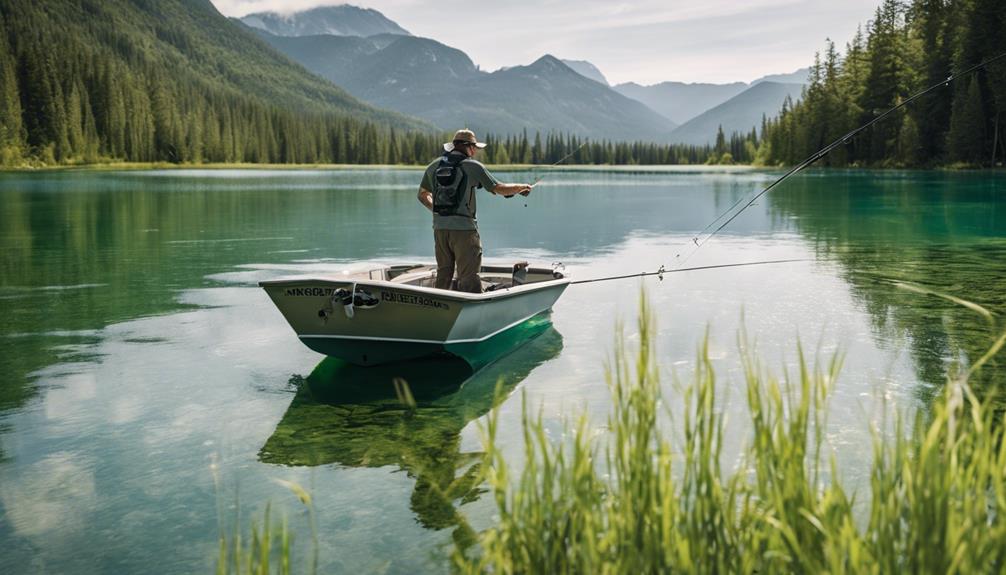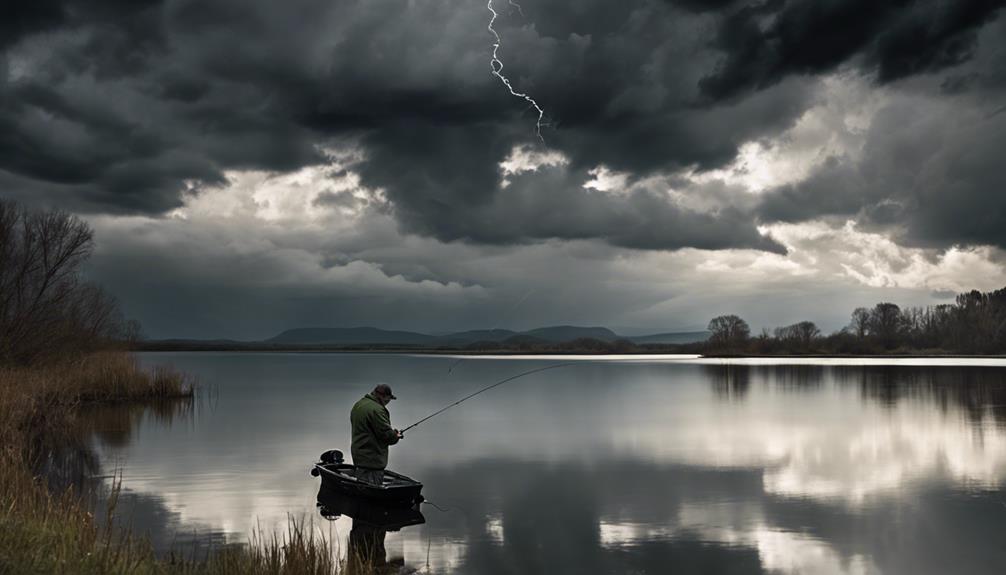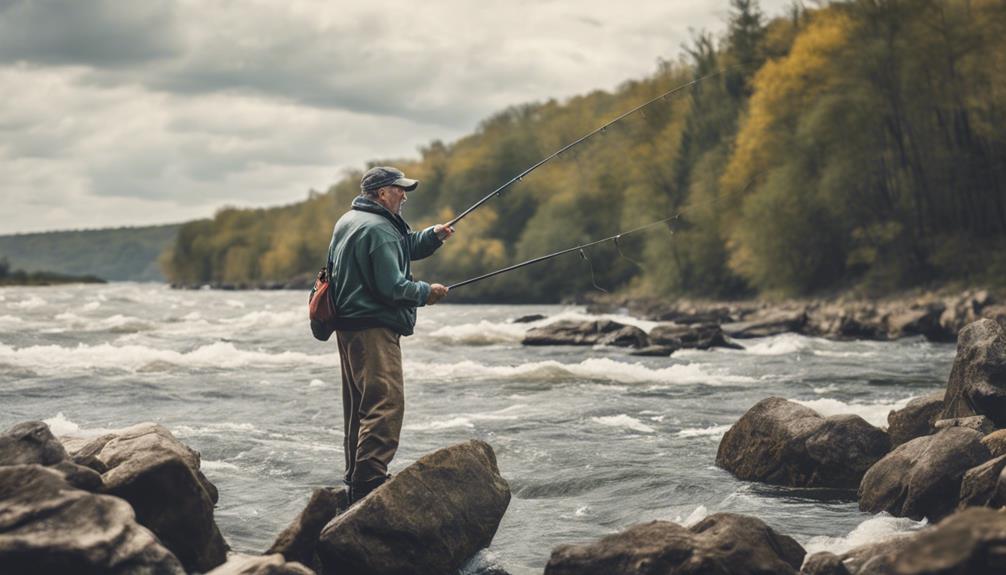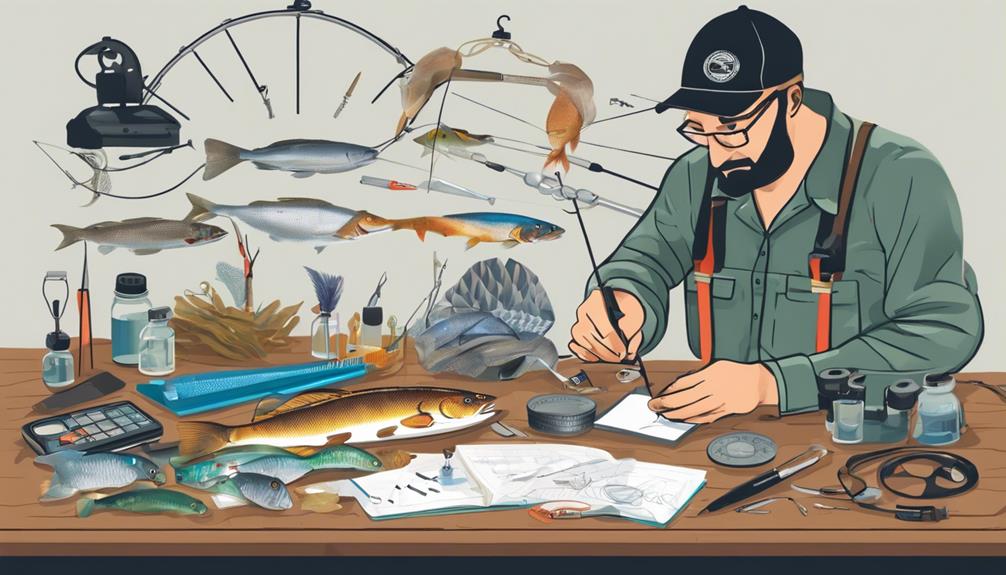Imagine yourself navigating the waters of opportunity within the realm of competitive professional angling. As you consider the various career paths available, from Tournament Angler to Fisheries Biologist, a world of possibilities unfolds before you.
Each role offers a unique blend of skills and experiences that can lead to a fulfilling career in the angling industry. But there's one particular career option that might surprise you, providing a behind-the-scenes look at the inner workings of angling competitions and a chance to influence the sport's future.
Tournament Angler
If you're passionate about fishing competitively, becoming a tournament angler can open up exciting career opportunities in the professional angling industry. As a tournament angler, you have the chance to secure sponsorship opportunities from fishing gear companies, apparel brands, and other relevant businesses looking to support skilled anglers. These sponsorships can provide you with financial backing, access to top-notch fishing equipment, and even potential travel support to compete in various tournaments.
Moreover, as a tournament angler, you'll likely receive significant media exposure. Tournaments are often covered by fishing magazines, websites, and TV shows, offering you the chance to showcase your skills to a wide audience. This exposure not only helps in building your personal brand but also attracts more sponsors and followers to support your angling career.
To make the most of sponsorship opportunities and media exposure, it's crucial to consistently perform well in tournaments, maintain a strong online presence through social media, and engage with fans and potential sponsors. By excelling in competitions and actively promoting yourself, you can establish a successful career as a tournament angler, enjoying the thrill of competitive fishing while also reaping the benefits of financial support and increased visibility in the angling industry.
Fishing Guide
Becoming a fishing guide offers a rewarding opportunity to share your passion for angling with others and help them experience the thrill of catching fish firsthand. As a fishing guide, mastering various fishing techniques is essential to ensure your clients have a successful and enjoyable fishing experience. Whether it's teaching them how to cast, jig, or troll, your expertise in different methods will be crucial in helping them reel in their prized catch.
In addition to fishing techniques, understanding business strategies is key to running a successful guiding service. From marketing your services to managing bookings and pricing, having a solid business plan can help you attract more clients and establish a reputable brand in the industry. Moreover, incorporating conservation efforts into your guiding practices is vital to protect the environment and ensure sustainable fishing opportunities for future generations.
Providing exceptional customer service is another fundamental aspect of being a fishing guide. Building rapport with your clients, catering to their needs, and creating memorable experiences won't only result in repeat business but also positive word-of-mouth referrals. By combining your passion for angling with business acumen, conservation ethics, and top-notch customer service, you can carve out a fulfilling career as a fishing guide.
Angling Coach
To excel as an angling coach, honing your expertise in instructing individuals on advanced fishing techniques is essential for guiding them towards mastering the art of angling. As an angling coach, your primary focus lies in angler mentorship and technique training. Your role involves more than just teaching basic fishing skills; you're tasked with elevating the abilities of seasoned anglers to help them reach peak performance.
Angler mentorship is at the core of your responsibilities. You must possess a deep understanding of various fishing methods and be able to convey this knowledge effectively to your students. Through personalized guidance and feedback, you can help anglers refine their techniques, adapt to different fishing conditions, and improve their overall performance on the water.
Technique training is another crucial aspect of your role as an angling coach. You should stay updated on the latest advancements in fishing gear, technology, and strategies. By incorporating these innovations into your coaching sessions, you can help anglers enhance their skills and stay competitive in the ever-evolving world of professional angling.
Pro Staff Member
As a Pro Staff Member in the professional angling industry, your role entails representing and promoting fishing equipment brands at events and through various marketing channels. Being a Pro Staff Member comes with its own set of responsibilities and perks. Here are some key points to consider:
- Sponsorship Benefits: One of the main advantages of being a Pro Staff Member is the opportunity to receive sponsorship benefits from fishing equipment brands. These benefits can include free or discounted gear, exposure on the brand's website and social media platforms, and sometimes even financial compensation.
- Event Strategies: To effectively represent the brand at events, you'll need to develop strategic approaches. This may involve engaging with attendees, demonstrating the proper use of the brand's products, and sharing your expertise to create a positive brand image.
- Networking Opportunities: As a Pro Staff Member, you'll have the chance to network with other anglers, industry professionals, and potential sponsors. Building these relationships can open up new opportunities for collaborations and growth in the angling community.
- Product Knowledge: It's crucial to have in-depth knowledge about the fishing equipment you're promoting. Understanding the features, benefits, and applications of the products will help you effectively communicate their value to customers.
- Brand Representation: Your actions and conduct as a Pro Staff Member reflect directly on the brand you represent. It's essential to uphold the brand's values, maintain professionalism, and act as a positive ambassador for the company.
Brand Ambassador
Representing a fishing equipment brand as a Brand Ambassador requires a deep understanding of the products and a strong commitment to promoting the brand's values. As a Brand Ambassador, you play a crucial role in building brand awareness and loyalty. Your primary responsibilities include engaging with the fishing community through various channels, such as social media, marketing partnerships, and promotional events.
Utilizing your social media presence, you act as a social media influencer, showcasing the brand's products in an authentic and appealing way. By creating engaging content that resonates with your audience, you can effectively drive interest and generate buzz around the brand. Collaborating with the brand on marketing partnerships allows you to reach a broader audience and maximize exposure.
Product endorsements are a key aspect of your role as a Brand Ambassador. You must have a deep knowledge of the brand's products to effectively communicate their features and benefits to potential customers. Through your genuine enthusiasm and expertise, you can influence purchasing decisions and build credibility for the brand.
Participating in promotional events, such as trade shows, tournaments, and community gatherings, provides valuable opportunities to interact with customers face-to-face. By representing the brand professionally and passionately, you can leave a lasting impression and strengthen customer loyalty. As a Brand Ambassador, your dedication and passion for the brand are essential in shaping its reputation and driving success in the competitive angling industry.
Fishing Writer
In the realm of professional angling, a Fishing Writer plays a vital role in capturing the essence of the sport through engaging and informative content. Writing about fishing requires a deep understanding of the sport and a passion for outdoor storytelling. As a Fishing Writer, you have the opportunity to share your experiences, techniques, and knowledge with a wide audience.
- Crafting Compelling Narratives: Your writing should transport readers to the serene waters, making them feel the excitement of reeling in a big catch.
- Educating and Informing: Through your articles, you can provide valuable tips on different fishing techniques, gear reviews, and conservation practices.
- Capturing the Thrill of the Catch: Describe the adrenaline rush of hooking a trophy fish and the patience required for success in fishing journalism.
- Building a Community: Engage with fellow anglers through your writing, creating a space for sharing stories and learning from each other.
- Showcasing the Beauty of Nature: Use your words to paint vivid pictures of the great outdoors, inspiring others to appreciate and protect our natural resources.
As a Fishing Writer, your words have the power to inspire, educate, and connect people through the shared love of fishing and the great outdoors.
Fisheries Biologist
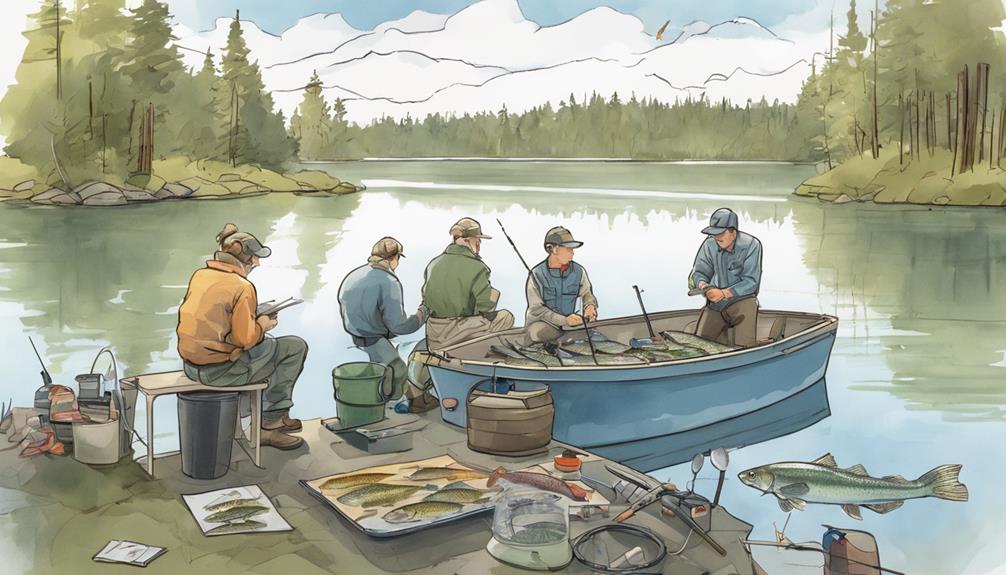
Conducting research on aquatic ecosystems, a Fisheries Biologist studies fish populations and their habitats to ensure sustainable management practices. As a Fisheries Biologist, you play a crucial role in understanding the dynamics of fish populations, their interactions with the environment, and the impact of human activities on aquatic ecosystems.
Research opportunities abound in this field, allowing you to delve into various aspects of fish biology, ecology, and conservation. By collecting data on fish populations, water quality, and habitat conditions, you contribute to the development of effective conservation strategies. Your work helps in identifying threats to fish populations, such as pollution, overfishing, and habitat destruction, and devising measures to mitigate these risks.
Conservation efforts are at the heart of a Fisheries Biologist's work. Through your research and analysis, you contribute to the preservation of aquatic biodiversity and the sustainable use of fisheries resources. By collaborating with government agencies, conservation organizations, and research institutions, you can actively participate in initiatives aimed at protecting and restoring fish habitats.
Tournament Director
Are you ready to oversee and coordinate competitive angling events as a Tournament Director? As a Tournament Director, you play a crucial role in ensuring the success of fishing tournaments. Your responsibilities range from planning the event logistics to executing marketing strategies to attract participants and sponsors. Here are some key aspects of being a Tournament Director:
- Event Planning: Your primary task involves meticulously planning all aspects of the fishing tournament, including selecting the location, setting the tournament schedule, and coordinating with vendors and staff to ensure smooth operations.
- Sponsorship Negotiations: Securing sponsorships is essential for funding the tournament and enhancing its overall success. As a Tournament Director, you'll be responsible for negotiating with potential sponsors to secure financial support and prizes for the event.
- Marketing Strategies: Developing effective marketing strategies is crucial for attracting anglers and spectators to the tournament. You'll need to create promotional materials, utilize social media platforms, and collaborate with local media to generate buzz around the event.
- Sponsorship Activation: Once sponsorships are secured, it's essential to activate them effectively. This involves showcasing sponsors prominently during the tournament, acknowledging their contributions, and ensuring their branding receives adequate exposure.
As a Tournament Director, your ability to excel in event planning, sponsorship negotiations, marketing strategies, and sponsorship activation will be critical to the success of competitive angling events.
Frequently Asked Questions
How Can I Become a Successful Angler Without Competing in Tournaments?
If you want to excel as an angler without tournament competition, focus on refining your fishing techniques and contributing to conservation efforts. By honing your skills and supporting environmental initiatives, you can stand out in the angling community.
Additionally, seek sponsorship opportunities through showcasing your angling experiences and dedication to the sport. Building a strong personal brand can open doors to various benefits and recognition in the fishing world.
What Skills and Qualifications Are Required to Become a Fishing Guide?
To become a fishing guide, you need solid fishing techniques and certification. Additionally, customer service and strong communication skills are key. These skills will help you provide an exceptional experience for your clients while guiding them on successful fishing trips.
Make sure to also stay knowledgeable about local fishing spots and regulations to ensure a safe and enjoyable outing for all.
Do Angling Coaches Work With Both Beginners and Experienced Anglers?
Yes, angling coaches work with both beginners and experienced anglers. They provide training on advanced techniques to help improve skills. Coaches offer professional development and mentorship to guide anglers at all levels.
Whether you're just starting out or looking to enhance your abilities, angling coaches can support your growth in the sport. With their expertise and guidance, you can advance your angling skills and reach new levels of proficiency.
How Does One Become a Pro Staff Member for a Fishing Company?
To become a pro staff member for a fishing company, start by building relationships with industry insiders. Network at events, engage on social media, and attend trade shows.
Show your passion for the sport and expertise. Develop a strong personal brand through consistent marketing strategies.
Research companies offering sponsorship opportunities and understand their pro staff requirements. Demonstrate your skills, knowledge, and ability to represent the brand effectively to increase your chances of landing a pro staff position.
What Is the Role of a Brand Ambassador in the Fishing Industry and How Can I Become One?
To become a brand ambassador in the fishing industry, focus on building relationships with companies through networking. Showcase your passion for fishing on social media to attract sponsorships. Demonstrate in-depth knowledge of products and engage with followers to promote brands effectively.
Conclusion
So whether you're casting for cash prizes as a tournament angler, teaching others the art of fishing as a guide or coach, or representing top fishing brands as a pro staff member or brand ambassador, there are plenty of exciting career opportunities in competitive professional angling.
From writing about your fishing adventures to studying fish populations as a fisheries biologist or organizing tournaments as a director, the world of angling is full of possibilities for those passionate about the sport.
